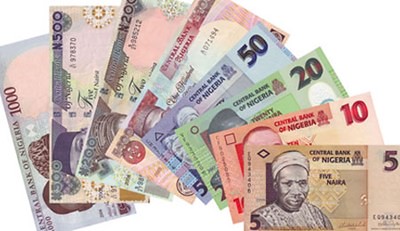
Federal Republic of Nigeria banknote known as the Naira., a photo by Pan-African News Wire File Photos on Flickr.
Liquidity Squeeze Hits Banks as NIBOR Rises to 44%
18 Sep 2013
Nigeria ThisDay
There were strong indications Tuesday that the severe liquidity squeeze experienced in the banking sector last month, when a 50 per cent Cash Reserve Requirement (CRR) for public sector deposits was imposed by the Central Bank of Nigeria (CBN), was biting hard.
This was apparent in the astronomical rise in the cost of lending among commercial banks yesterday as the Nigerian Interbank Offered Rates (NIBOR), which has inched upwards since September, climbed further to an average of 44 per cent from 28 per cent on Monday.
Data made available by the Financial Market Dealers Association (FMDA) showed that while the Call (Overnight) tenor increased to 44.67 per cent yesterday, from 25.83 per cent on Monday, the 7-day tenor also jumped to 43.12 per cent yesterday, from 24.12 the previous day.
A research note from the Renaissance Capital Limited (RenCap) pointed out that the development in the market could be as a result of the delayed impact of the increase in the CRR for public sector deposits.
The decision by the central bank to sterilise 50 per cent of public sector deposits in Deposit Money Banks (DMBs) had exposed the shallowness and fragility of the banking system. The monetary policy, which was announced at the July Monetary Policy Committee (MPC), also revealed the vulnerability of the banking system’s dependence on government deposits.
Nevertheless, the situation in the banking industry might even be worsened as there are indications that the Asset Management Corporation of Nigeria (AMCON) would soon start collecting its annual levies from the commercial banks.
RenCap explained: “This could be the delayed impact of the increase in the CRR for public sector deposits to 50 per cent which came into effect in August. On our estimates, that raised the blended CRR for the average Nigerian bank to about 17 per cent versus Kenyans at 5.25 per cent and Ghanaians at nine per cent.
“In addition, we hear AMCON may be looking to collect its’ annual levies from the banks. To date, the banks have been providing for these but the cash has not been collected. It now looks as if these funds could be removed from the banking system, placing pressure on more illiquid banks.”
However, Rencap noted that efficient and liquid banks such as Guaranty Trust Bank Plc (GTBank) would be able to “adapt and have good balance sheets.”
Continuing, it said: “Liquid banks with high Capital Adequacy Ratios (CARs) – Zenith Bank Plc, Fidelity Bank Plc, United Bank for Africa Plc (UBA) – they can be net placers on the interbank market.”
Therefore, the Lagos-based financial and advisory firm placed a ‘buy’ recommendation on GTBank, Zenith and UBA for investors in the stock market, saying that “Opportunity to purchase good names on weakness. These are our top picks. Fidelity – not as great quality but trading at 0.5x P/B with a sound balance sheet.
“Buy – ETI – still looks to deliver positive earnings momentum due to positive jaws effect.”
No comments:
Post a Comment